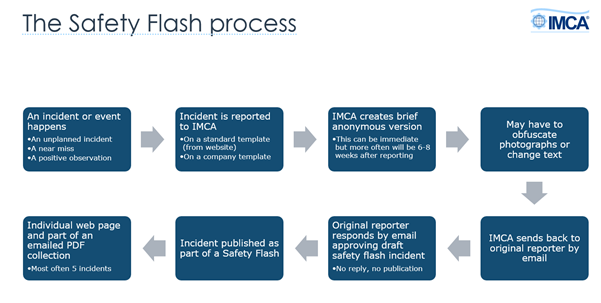Are we prepared to work safely?
Are we prepared to work safely? Are we prepared to do our bit in reducing incident and injury rates across our industry? The sharing of incidents is an important way IMCA members can get involved. IMCA has been publishing Safety Flashes for over 20 years. Today, our members tell us consistently that Safety Flashes are one of the most valuable deliverables IMCA produces. We publish a Safety Flash once every ten days or so, bringing to members a snapshot of incidents and learnings from across the IMCA membership, from the wider maritime industry, and when appropriate, from other industries.
By submitting incidents and events to IMCA, you will be helping to identify potential hazards, share lessons learnt and avoid repetition. Any member can submit material to [email protected], or send it directly to Nick Hough at the secretariat. Nick will be happy to talk with you and reassure you if you have any concerns regarding anonymity. We check carefully before issue and publish only with your clear permission. Of course it is sometimes necessary for members to take legal advice before sharing incident information, but it can’t be stressed enough that published safety flashes are always completely anonymous.
Let us look in detail at the process. An incident or event happens. It could be an unplanned incident, or a near miss, or even a positive observation – something that went right. A member can submit a report to IMCA on a standard IMCA template, or on their own company template. We will then prepared a brief anonymous version and this will be sent back for review to you, the member. No further action is taken until the originator signals clearly that the incident is OK to be published. Sometimes a number of iterations of this process are required. Sometimes we need to obfuscate photographs, or remove or add text. Finally then the Incident published as part of a Safety Flash. It will be available as an individual web page and also as part of an emailed PDF collection, most often comprising five incidents.
If there is an event or incident of the highest urgency or priority – for example if a member suffered an incident involving multiple fatalities – this can be fast-tracked and approved in less than a day, though the process usually takes longer.

We will ensure the language and tone is right – Safety Flash incidents are succinct, specific, factually correct and written in clear language. We look for a concise title, and the focus should be on lessons learnt and how to prevent a recurrence.
The target audience of IMCA Safety Flashes is not our members’ safety professionals – it is seafarers, riggers, crane drivers, captains, bosuns. The people working at the sharp end of our members’ operations. We always start work – we never “commence operations”. We’re looking to establish, often in little more than one page,
- What happened?
- Why did it happen?
- What were the causes?
- What must you do to stop it happening again?
IMCA Safety Flashes are free to air – we don’t charge for safety, although the emailed bulletin is reserved for our paying members. They are anonymous, respected and trusted. They are short, to the point, and relevant. They are a benefit to members and to the wider industry. Sharing information about is ALWAYS “win:win”.
Editorial
Feedback and suggestions for future articles are welcome: [email protected]
Subscribe
Online signup coming soon - in the meantime, please email [email protected]
